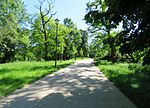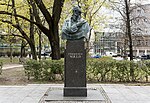Senate of Poland

The Senate (Polish: Senat) is the upper house of the Polish parliament, the lower house being the Sejm. The history of the Polish Senate stretches back over 500 years; it was one of the first constituent bodies of a bicameral parliament in Europe and existed without hiatus until the final partition of the Polish state in 1795. The contemporary Senate is composed of 100 senators elected by a universal ballot and is headed by Marshal of the Senate (Marszałek Senatu). The incumbent Marshal of the Senate is Tomasz Grodzki. Following a brief period of existence under the Second Polish Republic, the Senate was again abolished by the authorities of the Polish People's Republic. It was not re-established until the collapse of the communist government and reinstatement of democracy in Poland in 1989. The Senate is based in Warsaw and is located in a building which forms part of the Sejm Complex on Wiejska Street, in close proximity to the Three Crosses Square and Ujazdów Castle.
Excerpt from the Wikipedia article Senate of Poland (License: CC BY-SA 3.0, Authors, Images).Senate of Poland
Piotra Maszyńskiego, Warsaw Śródmieście (Warsaw)
Geographical coordinates (GPS) Address Website Nearby Places Show on map
Geographical coordinates (GPS)
| Latitude | Longitude |
|---|---|
| N 52.2256 ° | E 21.03 ° |
Address
Senat RP
Piotra Maszyńskiego
00-485 Warsaw, Śródmieście (Warsaw)
Masovian Voivodeship, Poland
Open on Google Maps










